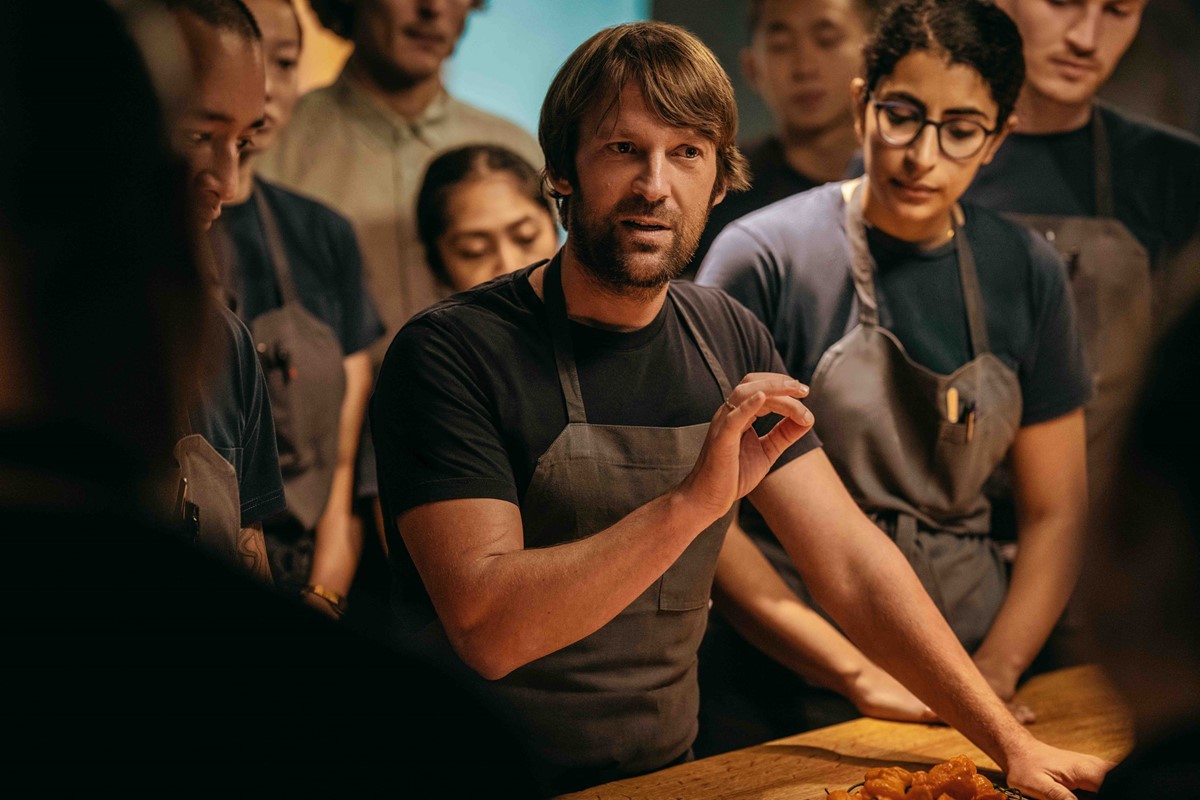
Rewrite
Lead ImageRené Redzepi and the team at Noma in “Omnivore” Now streaming on Apple TV+
Zooming in from Kyoto at dusk, René Redzepi is talking about bugs with great excitement. The ancient Japanese city is the latest location for Noma’s new pop-up residency, and the infamous Danish chef is talking animatedly about the apricot-sized cicadas and cockroaches that litter Kyoto’s streets during the unbearably humid summers. “It’s no joke, let me tell you,” he laughs, childlike in his fascination with – and aversion to – the region’s extreme climate.
As the head chef and co-founder of Noma, a restaurant credited with inventing an entirely new cuisine – New Nordic – based on seasonality, fermentation and the foraging of local ingredients like berries, mushrooms, and edible flowers, Redzepi’s influence on the world of fine dining is immeasurable. Voted the best restaurant in the world on five separate occasions, Noma is arguably the most famous one in the world too, with its earthy, high-end aesthetic being mimicked by chefs everywhere for the past two decades, and even appearing on screen, too. In season two of The Bear, pastry chef Marcus (Lionel Boyce) goes on a soul-searching voyage to Noma, concocting delicate puddings under the tutelage of a chef played by Will Poulter; The Menu (2022), a bloodthirsty satire of the fine dining scene led by a po-faced Ralph Fiennes, was more unkind in its allusion to the restaurant, poking fun at the self-seriousness, extravagant costs, and casual abuse that is part and parcel of fine dining (in an essay from 2015, Redzepi confessed to having “been a bully for a large part of my career. I’ve yelled and pushed people. I’ve been a terrible boss at times”).
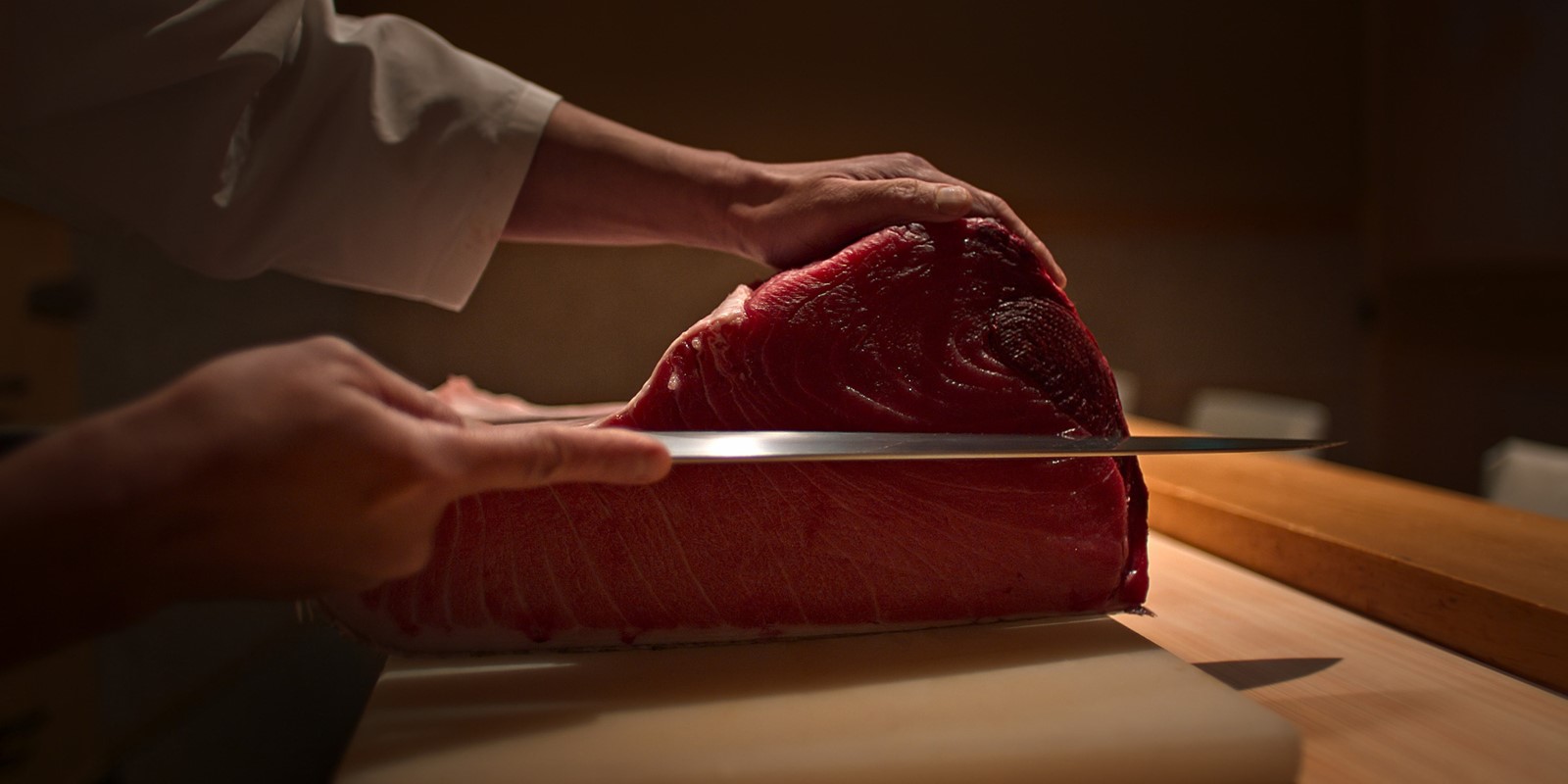
But last year, in a shock move, Redzepi announced the permanent closure of Noma’s Copenhagen location; if the king of fine dining was to close his beloved restaurant, what did that say about the state of fine dining? Citing the unsustainability of the working culture chefs must endure on the job, Noma will now operate on a pop-up basis only, and has already appeared in Kyoto, New York, and Mexico. Ever the iconoclast, Redzepi is more devoted to bigger picture questions around food and sustainability these days, publishing recipe books and magazines, and now, for the first time, he’s turned his hand to television.
Omnivore – a seductive, globe-trotting show made with Apple TV+ – explores the hidden labour and surprising histories behind eight ingredients: salt, pork, corn, tuna, coffee, rice, banana, and chile. Highly ambitious and stunningly shot (the budget of the show has not been disclosed, but it was clearly vast), the show takes viewers from Tokyo’s cutthroat fish markets to the astonishingly beautiful salt flats of Peru. Inspired by the mesmerising nature shows of David Attenborough (Planet Earth), Omnivore capitalises on Redzepi’s natural flair as a visual and verbal storyteller; this show is environmental consciousness-raising cloaked in immense, mouth-watering beauty.
Below, René Redzepi talks about his decision to close Noma Copenhagen, his thoughts on The Bear, and the future of fine dining.
Violet Conroy: Where did you grow up and how did you first get into food?
René Redzepi: I grew up between Denmark and what was then called Yugoslavia; my father was an Albanian Muslim immigrant to Denmark. My life has been influenced particularly by the Albanian food heritage, which was very poor in a lot of things, but extremely rich in cooking. I then went to cooking school when I was 15, and very quickly found a passion – it was almost as if I was hit by lightning. I travelled the world a little bit – America, Spain, France – and then, at the age of 25, I opened Noma. We got this incredible success very quickly, and with this success came all sorts of opportunities, which included TV.
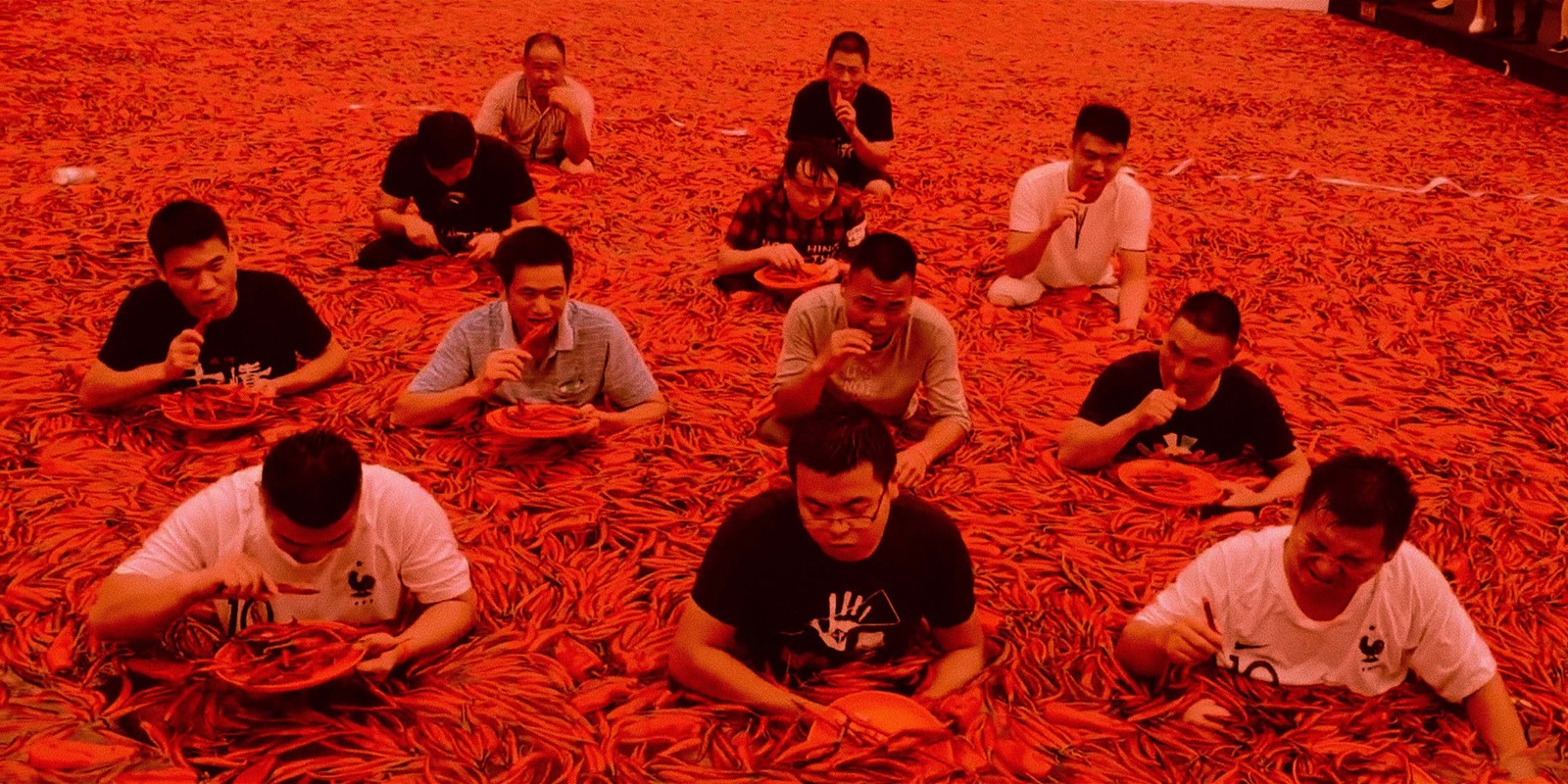
VC: What kind of TV deals were you being offered?
RR: People were offering me TV for the sake of TV, but I was never into that. One of the few TV shows I remember while growing up is David Attenborough’s nature shows. I was so calmed by his voice, and felt like I was traveling for an hour when I watched them. That’s when the idea for Omnivore began: can we do the same thing [as David Attenborough], but with food and ingredients as the lens? And teach people something about the food world that they didn’t know? Perhaps that will allow people to appreciate and acknowledge the value of food more.
VC: Even though you’re this omniscient narrator, I found it interesting that you and Noma aren’t actually the focus of Omnivore. Is this a reaction against you being so firmly at the centre of things as a celebrity chef?
RR: The subject of the show is the ingredients and the people. It’s not about me, I’m not doing this to be on TV. I’m doing it to tell these stories, to help push forward the idea of what food is. So at first, I actually tried to bake it into the contract that I would be a on screen for a maximum of three minutes per episode. Of course, that didn’t pan out … but I’m not in some of the episodes at all, like the pig episode. And I think it just makes everything so much better. I’m there as a guide, not a host.
Frankly, [it’s great] that Apple TV+ dared to accept that because, when it comes to food shows, they’re very dependent on a big celebrity host, like you see with Stanley Tucci for example. And while you say I’m a celebrity chef … I might be very well known in the foodie community, but that’s incredibly small in comparison to what actual celebrities experience.
“The biggest innovators in food right now are TikTok creators. A big YouTuber has more opportunities today than any chef has” – René Redzepi
VC: Omnivore feels like a piece of very slow and thoughtful journalism, which stands in contrast to clickbait online food content. Do you see yourself as working against this culture of virality?
RR: The biggest innovators in food right now are TikTok creators. A big YouTuber has more opportunities today than any chef has, and they understand how to use these new forms of media. I can’t say that we necessarily work against it, but it’s not the only way that we should be consuming our information, through these constant flickers of new things that pass us by on our screens. Sometimes, you should allow yourself to sit and really take in the slowness of our 45-minute episode on a pig, for example. But I still wonder if people can actually watch the show and not be flicking through social media on their phones at the same time. I don’t mind social media, but I prefer to learn the slow way. To tell the truth, I don’t even watch that much TV.
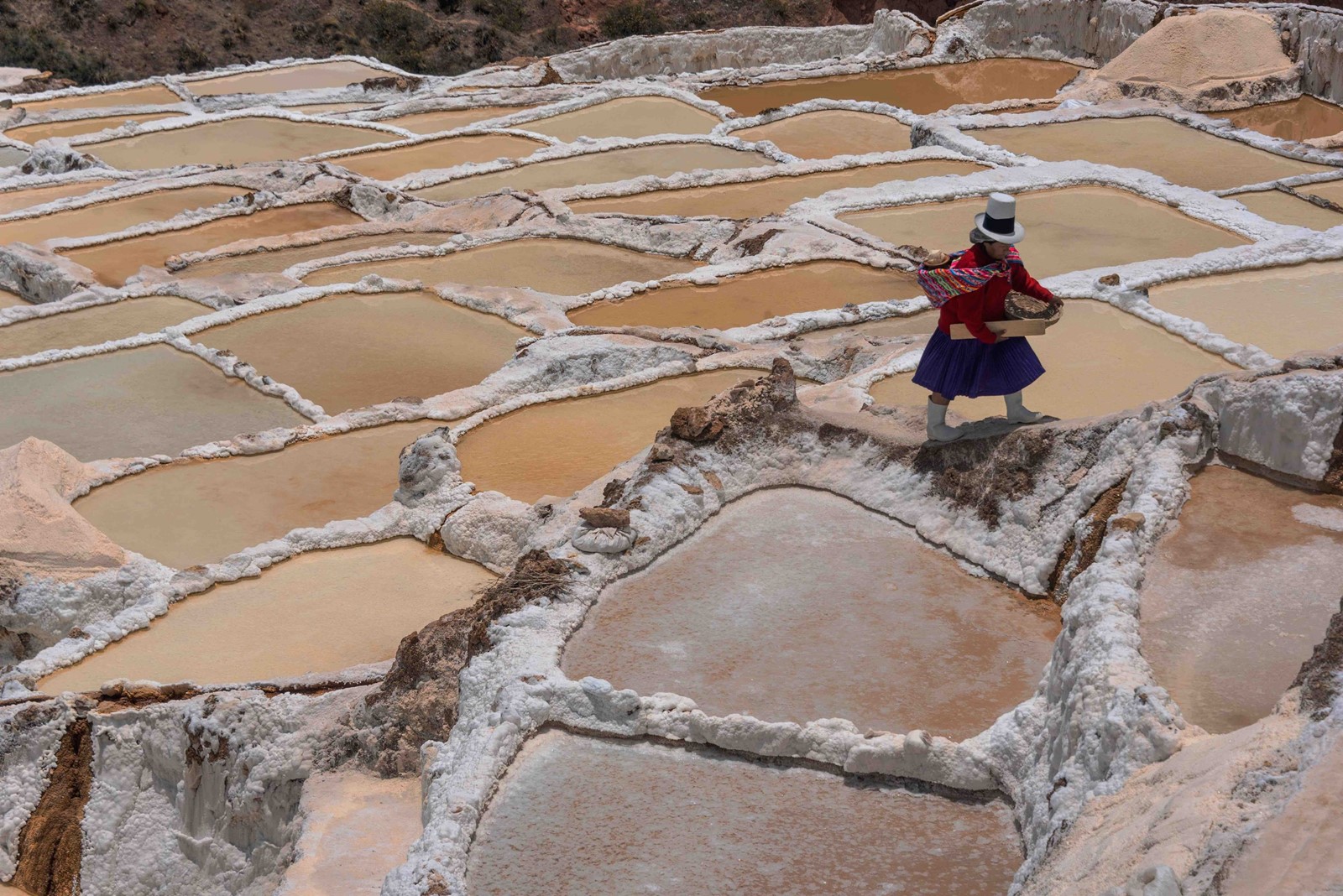
VC: What do you make of the depictions of Noma in recent TV shows and films like The Bear and The Menu?
RR: [Laughs]. I tried to watch The Menu, but I just found it so boring. Is it making fun of restaurants or making fun of the diners? I’m not sure, maybe it’s both. But at the end of the day, it just keeps pushing Noma forward. There’s a moment in The Menu when Ralph Fiennes is clapping his hands to get the attention of people. That was a famous thing that Magnus Nilsson used to at Fäviken, so the film is a mix of many different iconic moments from the fine dining scene.
And I haven’t watched The Bear either, although I really like the team. While it definitely resembles the truth and reality of our industry, it is also very exaggerated – the drama of the show is so intense. Because of that, it’s almost stressful for me.
VC: Last year, you announced that you’d be closing Noma in Copenhagen. Why did you make that decision, and how do you see the future of the restaurant?
RR: I made the decision to close Noma Copenhagen during the first lockdown. I wanted restaurant work to be somewhere we could have fun and not where we earn our living. And after 21 years of work, with the network we have and the expertise we’ve accumulated, we tried to put that to use in a way that’s not just benefitting 40-50 people [the Noma customers] every night. How can we actually participate in food in a broader and bigger way that pushes food forward? We’re collaborating with foundations, the government, but also with private companies. It looks like we’ll be participating in food innovation in a profound way, and doing so with our main superpower, which is the power of flavour and deliciousness.
One of the projects we’re working on is called the future staples of food. It’s actually a project that was inspired by Omnivore, with us travelling the world and dabbling in some of these mega food staples like rice or corn, and understanding that a lot of these crops are deeply under pressure, and we cannot necessarily rely on having as much of them in the future. We might need to find ways to eat other things, so what could that be? There’s seaweed, mushrooms, legumes, bugs …
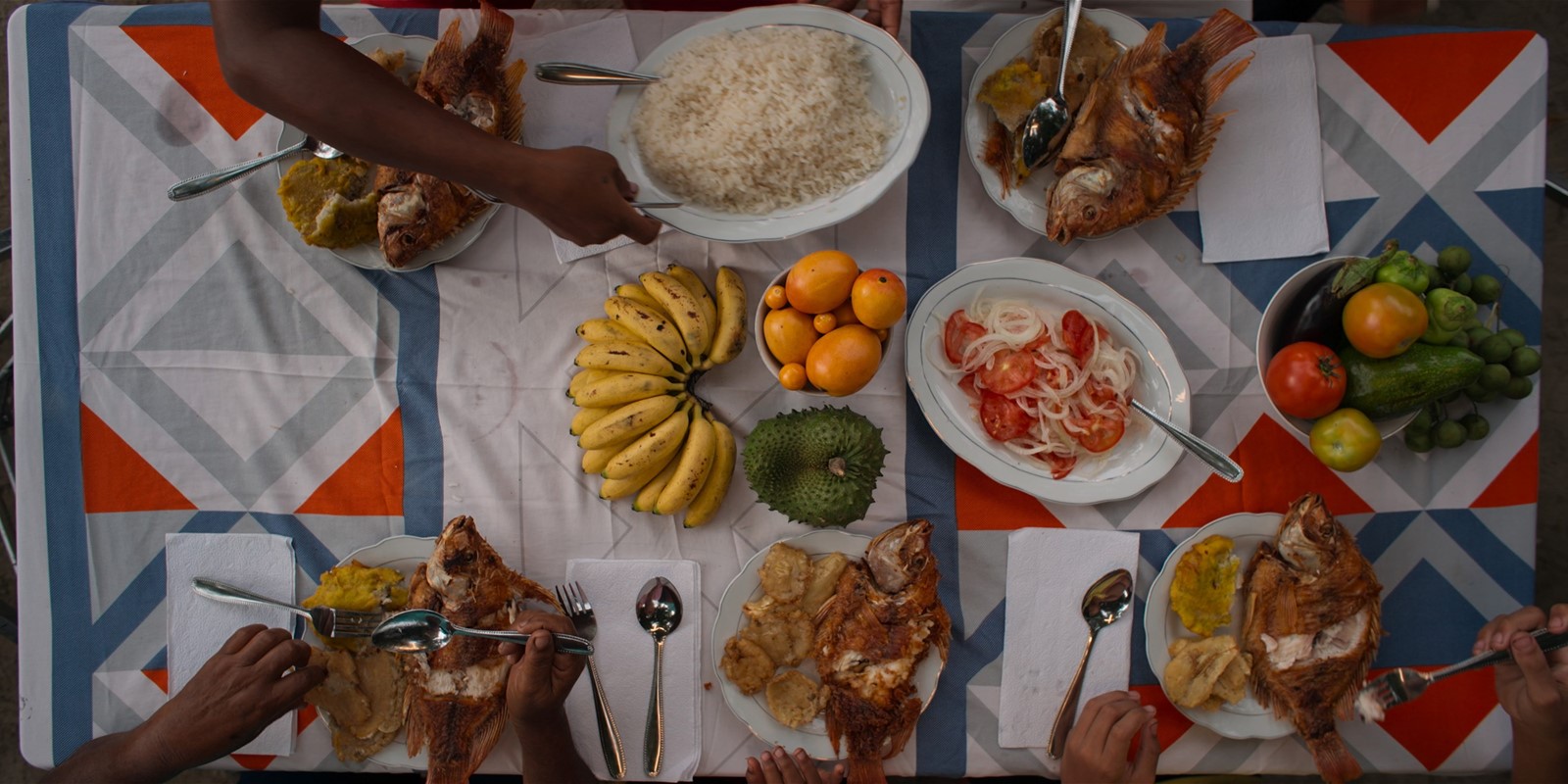
VC: What’s one ingredient you can’t live without?
RR: One ingredient I honestly can’t live without is chocolate. I can survive without it, but if we’re talking about living without it – the difference between what we need to stay alive and what we need to feel alive – that’s very, very big in my world. Chocolate is my main vice. I eat 100 to 200 grams of dark chocolate from Mexico every day.
“I tried to watch The Menu, but I just found it so boring. Is it making fun of restaurants or making fun of the diners? I’m not sure, maybe it’s both” – René Redzepi
VC: Do you have any tips for how people living in cities can become more connected to their food – especially considering that financial costs are a huge barrier to eating well?
RR: The first thing people can start with is basic cooking. And when I say basic cooking, today, for instance, my dinner was fresh, steamed rice with an omelette on top. I then seasoned my omelette with salt, cracked pepper, and chilli paste. I came home under a lot of pressure after work – my wife is in Denmark, and I have two kids here while also working – and so I made the simplest of things.
Start by learning how to cook different eggs and make rice dishes with it, or learn how to cook a potato and then make a mash from potato. Very few people cook because we have busy lives, but I also think we’re spending quite a bit of time on our phones. Perhaps if we cook a little bit, that’s a good start to connecting yourself [to food]. And I think cooking is one of the most powerful things you can do for your children as well. You give them something they never, ever, ever lose. When they’re young, if you teach them how to cook rice and how to use it the day after, and other basic things, they have a skill set that will make them happy and healthy.
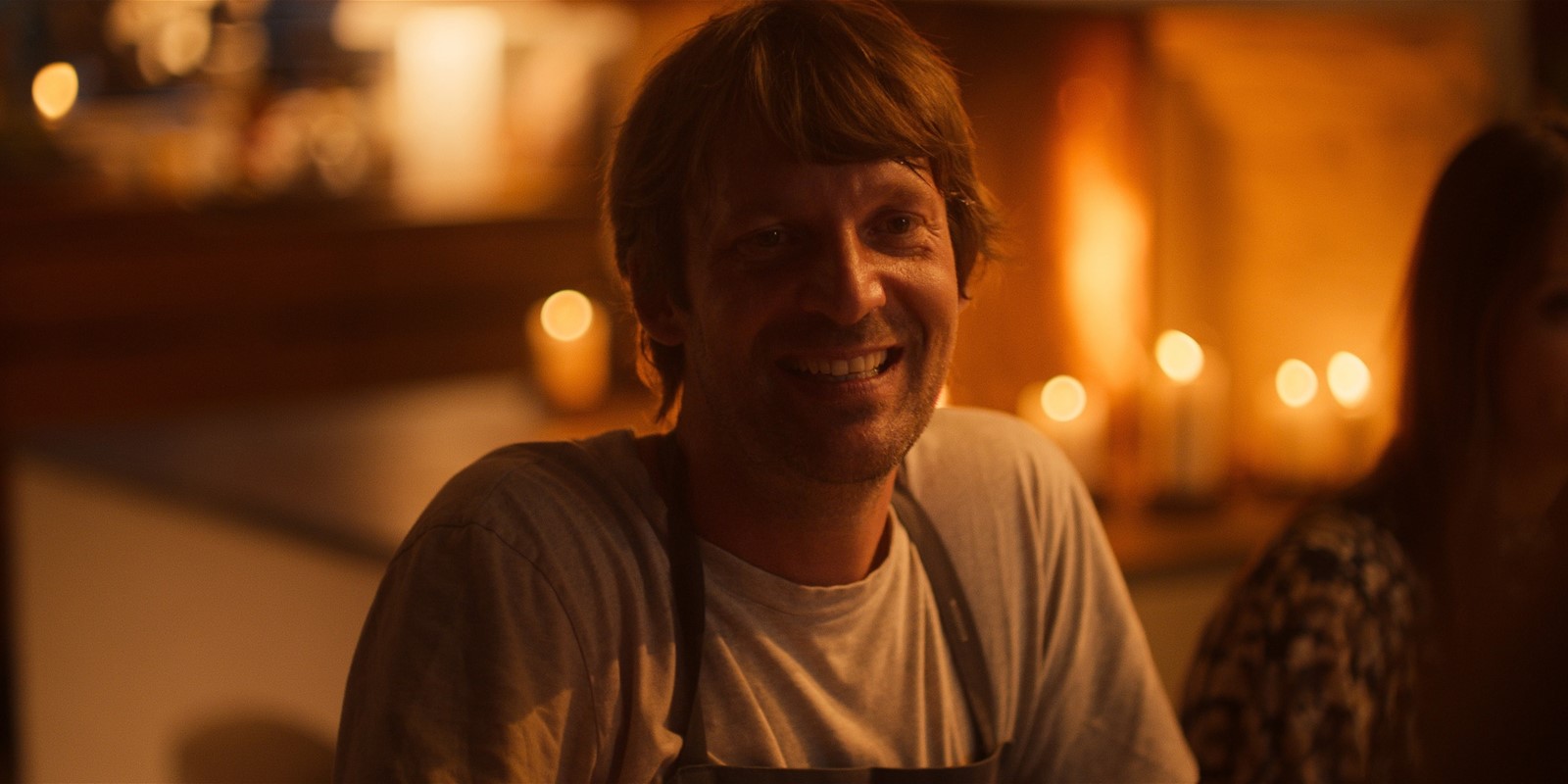
VC: How do you see the future of fine dining?
RR: In a very digitsed world, people are looking for experiences. I don’t think fine dining is going away by any means. Right now we’re in a crisis, don’t get me wrong – people have less work – but it’s not going away. Where I think fine dining will have to figure out how to reinvent itself is how we work together, how we inspire each other, and how we plan for a better work life for everyone that’s involved in cooking.
There’s the low hanging fruit, which is to change yourself and be a better leader. The thing that’s a little more difficult is that the restaurant industry is always struggling financially, they’re just scraping by. So [it’s about] finding a model where revenue comes in that allows you to move forward in a better way. Noma 3.0 is a reaction to some of these questions that I have been dabbling with myself for a long time.
These are the problems for fine dining, but also most cooking in general. Chefs of all levels work hard and are not paid very much. Right now, somewhere in central London, somebody is sweating their ass off to make you brunch.
Omnivore is available to stream on Apple TV+ now.
in HTML format, including tags, to make it appealing and easy to read for Japanese-speaking readers aged 20 to 40 interested in fashion. Organize the content with appropriate headings and subheadings (h1, h2, h3, h4, h5, h6), translating all text, including headings, into Japanese. Retain any existing
tags from
Lead ImageRené Redzepi and the team at Noma in “Omnivore” Now streaming on Apple TV+
Zooming in from Kyoto at dusk, René Redzepi is talking about bugs with great excitement. The ancient Japanese city is the latest location for Noma’s new pop-up residency, and the infamous Danish chef is talking animatedly about the apricot-sized cicadas and cockroaches that litter Kyoto’s streets during the unbearably humid summers. “It’s no joke, let me tell you,” he laughs, childlike in his fascination with – and aversion to – the region’s extreme climate.
As the head chef and co-founder of Noma, a restaurant credited with inventing an entirely new cuisine – New Nordic – based on seasonality, fermentation and the foraging of local ingredients like berries, mushrooms, and edible flowers, Redzepi’s influence on the world of fine dining is immeasurable. Voted the best restaurant in the world on five separate occasions, Noma is arguably the most famous one in the world too, with its earthy, high-end aesthetic being mimicked by chefs everywhere for the past two decades, and even appearing on screen, too. In season two of The Bear, pastry chef Marcus (Lionel Boyce) goes on a soul-searching voyage to Noma, concocting delicate puddings under the tutelage of a chef played by Will Poulter; The Menu (2022), a bloodthirsty satire of the fine dining scene led by a po-faced Ralph Fiennes, was more unkind in its allusion to the restaurant, poking fun at the self-seriousness, extravagant costs, and casual abuse that is part and parcel of fine dining (in an essay from 2015, Redzepi confessed to having “been a bully for a large part of my career. I’ve yelled and pushed people. I’ve been a terrible boss at times”).

But last year, in a shock move, Redzepi announced the permanent closure of Noma’s Copenhagen location; if the king of fine dining was to close his beloved restaurant, what did that say about the state of fine dining? Citing the unsustainability of the working culture chefs must endure on the job, Noma will now operate on a pop-up basis only, and has already appeared in Kyoto, New York, and Mexico. Ever the iconoclast, Redzepi is more devoted to bigger picture questions around food and sustainability these days, publishing recipe books and magazines, and now, for the first time, he’s turned his hand to television.
Omnivore – a seductive, globe-trotting show made with Apple TV+ – explores the hidden labour and surprising histories behind eight ingredients: salt, pork, corn, tuna, coffee, rice, banana, and chile. Highly ambitious and stunningly shot (the budget of the show has not been disclosed, but it was clearly vast), the show takes viewers from Tokyo’s cutthroat fish markets to the astonishingly beautiful salt flats of Peru. Inspired by the mesmerising nature shows of David Attenborough (Planet Earth), Omnivore capitalises on Redzepi’s natural flair as a visual and verbal storyteller; this show is environmental consciousness-raising cloaked in immense, mouth-watering beauty.
Below, René Redzepi talks about his decision to close Noma Copenhagen, his thoughts on The Bear, and the future of fine dining.
Violet Conroy: Where did you grow up and how did you first get into food?
René Redzepi: I grew up between Denmark and what was then called Yugoslavia; my father was an Albanian Muslim immigrant to Denmark. My life has been influenced particularly by the Albanian food heritage, which was very poor in a lot of things, but extremely rich in cooking. I then went to cooking school when I was 15, and very quickly found a passion – it was almost as if I was hit by lightning. I travelled the world a little bit – America, Spain, France – and then, at the age of 25, I opened Noma. We got this incredible success very quickly, and with this success came all sorts of opportunities, which included TV.

VC: What kind of TV deals were you being offered?
RR: People were offering me TV for the sake of TV, but I was never into that. One of the few TV shows I remember while growing up is David Attenborough’s nature shows. I was so calmed by his voice, and felt like I was traveling for an hour when I watched them. That’s when the idea for Omnivore began: can we do the same thing [as David Attenborough], but with food and ingredients as the lens? And teach people something about the food world that they didn’t know? Perhaps that will allow people to appreciate and acknowledge the value of food more.
VC: Even though you’re this omniscient narrator, I found it interesting that you and Noma aren’t actually the focus of Omnivore. Is this a reaction against you being so firmly at the centre of things as a celebrity chef?
RR: The subject of the show is the ingredients and the people. It’s not about me, I’m not doing this to be on TV. I’m doing it to tell these stories, to help push forward the idea of what food is. So at first, I actually tried to bake it into the contract that I would be a on screen for a maximum of three minutes per episode. Of course, that didn’t pan out … but I’m not in some of the episodes at all, like the pig episode. And I think it just makes everything so much better. I’m there as a guide, not a host.
Frankly, [it’s great] that Apple TV+ dared to accept that because, when it comes to food shows, they’re very dependent on a big celebrity host, like you see with Stanley Tucci for example. And while you say I’m a celebrity chef … I might be very well known in the foodie community, but that’s incredibly small in comparison to what actual celebrities experience.
“The biggest innovators in food right now are TikTok creators. A big YouTuber has more opportunities today than any chef has” – René Redzepi
VC: Omnivore feels like a piece of very slow and thoughtful journalism, which stands in contrast to clickbait online food content. Do you see yourself as working against this culture of virality?
RR: The biggest innovators in food right now are TikTok creators. A big YouTuber has more opportunities today than any chef has, and they understand how to use these new forms of media. I can’t say that we necessarily work against it, but it’s not the only way that we should be consuming our information, through these constant flickers of new things that pass us by on our screens. Sometimes, you should allow yourself to sit and really take in the slowness of our 45-minute episode on a pig, for example. But I still wonder if people can actually watch the show and not be flicking through social media on their phones at the same time. I don’t mind social media, but I prefer to learn the slow way. To tell the truth, I don’t even watch that much TV.

VC: What do you make of the depictions of Noma in recent TV shows and films like The Bear and The Menu?
RR: [Laughs]. I tried to watch The Menu, but I just found it so boring. Is it making fun of restaurants or making fun of the diners? I’m not sure, maybe it’s both. But at the end of the day, it just keeps pushing Noma forward. There’s a moment in The Menu when Ralph Fiennes is clapping his hands to get the attention of people. That was a famous thing that Magnus Nilsson used to at Fäviken, so the film is a mix of many different iconic moments from the fine dining scene.
And I haven’t watched The Bear either, although I really like the team. While it definitely resembles the truth and reality of our industry, it is also very exaggerated – the drama of the show is so intense. Because of that, it’s almost stressful for me.
VC: Last year, you announced that you’d be closing Noma in Copenhagen. Why did you make that decision, and how do you see the future of the restaurant?
RR: I made the decision to close Noma Copenhagen during the first lockdown. I wanted restaurant work to be somewhere we could have fun and not where we earn our living. And after 21 years of work, with the network we have and the expertise we’ve accumulated, we tried to put that to use in a way that’s not just benefitting 40-50 people [the Noma customers] every night. How can we actually participate in food in a broader and bigger way that pushes food forward? We’re collaborating with foundations, the government, but also with private companies. It looks like we’ll be participating in food innovation in a profound way, and doing so with our main superpower, which is the power of flavour and deliciousness.
One of the projects we’re working on is called the future staples of food. It’s actually a project that was inspired by Omnivore, with us travelling the world and dabbling in some of these mega food staples like rice or corn, and understanding that a lot of these crops are deeply under pressure, and we cannot necessarily rely on having as much of them in the future. We might need to find ways to eat other things, so what could that be? There’s seaweed, mushrooms, legumes, bugs …

VC: What’s one ingredient you can’t live without?
RR: One ingredient I honestly can’t live without is chocolate. I can survive without it, but if we’re talking about living without it – the difference between what we need to stay alive and what we need to feel alive – that’s very, very big in my world. Chocolate is my main vice. I eat 100 to 200 grams of dark chocolate from Mexico every day.
“I tried to watch The Menu, but I just found it so boring. Is it making fun of restaurants or making fun of the diners? I’m not sure, maybe it’s both” – René Redzepi
VC: Do you have any tips for how people living in cities can become more connected to their food – especially considering that financial costs are a huge barrier to eating well?
RR: The first thing people can start with is basic cooking. And when I say basic cooking, today, for instance, my dinner was fresh, steamed rice with an omelette on top. I then seasoned my omelette with salt, cracked pepper, and chilli paste. I came home under a lot of pressure after work – my wife is in Denmark, and I have two kids here while also working – and so I made the simplest of things.
Start by learning how to cook different eggs and make rice dishes with it, or learn how to cook a potato and then make a mash from potato. Very few people cook because we have busy lives, but I also think we’re spending quite a bit of time on our phones. Perhaps if we cook a little bit, that’s a good start to connecting yourself [to food]. And I think cooking is one of the most powerful things you can do for your children as well. You give them something they never, ever, ever lose. When they’re young, if you teach them how to cook rice and how to use it the day after, and other basic things, they have a skill set that will make them happy and healthy.

VC: How do you see the future of fine dining?
RR: In a very digitsed world, people are looking for experiences. I don’t think fine dining is going away by any means. Right now we’re in a crisis, don’t get me wrong – people have less work – but it’s not going away. Where I think fine dining will have to figure out how to reinvent itself is how we work together, how we inspire each other, and how we plan for a better work life for everyone that’s involved in cooking.
There’s the low hanging fruit, which is to change yourself and be a better leader. The thing that’s a little more difficult is that the restaurant industry is always struggling financially, they’re just scraping by. So [it’s about] finding a model where revenue comes in that allows you to move forward in a better way. Noma 3.0 is a reaction to some of these questions that I have been dabbling with myself for a long time.
These are the problems for fine dining, but also most cooking in general. Chefs of all levels work hard and are not paid very much. Right now, somewhere in central London, somebody is sweating their ass off to make you brunch.
Omnivore is available to stream on Apple TV+ now.
and integrate them seamlessly into the new content without adding new tags. Ensure the new content is fashion-related, written entirely in Japanese, and approximately 1500 words. Conclude with a “結論” section and a well-formatted “よくある質問” section. Avoid including an introduction or a note explaining the process.


